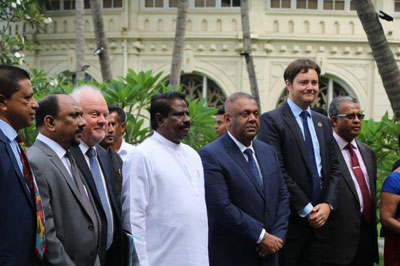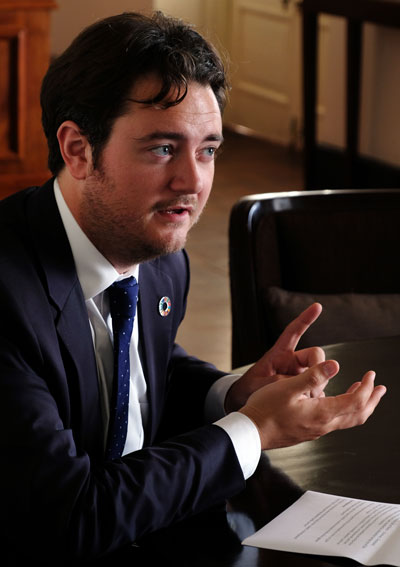Public sector recruitment transparent and merit-based in Norway, visiting State Foreign Minister says
View(s):With a great history of seafaring and fishing, the Norwegians are now helping Sri Lanka to map out a resource map of the country’s marine and fisheries resources during a month-journey round the island.

At the inauguration of the Regional Symposium on SDG 14 Life Below Water in Colombo. The visiting Minister is second from right.
And at hand to see the start of this new relationship between Sri Lanka and Norway was that country’s State Foreign Minister Jens Frølich Holte. His visit was connected to Norwegian research vessel Dr. Fridtjof Nansen’s 26-day journey round Sri Lanka, beginning last week, to assess the country’s marine resources.
The youthful and tall 33-year old politician armed with an MSc in Economic History from the London School of Economics and Political Science, sat down with the Business Times last week (Friday) at the Galle Face hotel, Colombo for an exclusive interview, during his busy schedule which he said meant “a lot of meetings in closed rooms and little time to experience this beautiful country”.
He spoke and responded on a range of issues from concern over the US pullout from the UN Human Rights Council, concern of plastic destroying the environment and marine resources, peace building, corruption, education and a transparent public service.
Excerpts of the interview:
On the visit to Sri Lanka:
It’s my first time in Sri Lanka, also in the region. This is a new experience and a good experience. This is a beautiful country though I didn’t have much time to visit due to several meetings to understand the relationship between Norway and Sri Lanka.
Issue of plastics pollution:
This is something that Norway is very serious about. We had a wake-up call in March 2017 when a dead grey whale washed ashore and we found it had 80 kg of plastic bags in its stomach.
The situation is getting serious because a month ago the same thing happened in Thailand when a whale washed ashore having eaten plastic bags.
We are launching a global effort to reduce marine pollution to ensure clean seas and keep fish healthy.

Minister Jens Frølich Holte
Unlike Sri Lanka which is getting rid of plastic bags, this may not be the right solution in Norway since plastic bags are used for waste management in homes and thereafter incinerated. But they are not floating around as littering is a serious offence.
Some of our cities have banned helium balloons, some cafes have also banned the use of plastic.
The Norwegian PM is chairing a high level panel on the sustainable use of the oceans. The plan is to create jobs and provide incomes while at the same time keeping the environment healthy … you need to do both things to have a sustainable programme.
Secondly there is a development programme on marine littering; we are investing US$35 million into marine littering and also helping the World Bank set up a global fund targeting waste infrastructure.
On peace building:
In my meetings, we discussed Norway’s role in the peace process. Norway has a long relationship with Sri Lanka and now we are in a new phase and we are happy with the relationship with the current government, it is a government that is open minded … and we are very eager to engage them and support the development of Sri Lanka in ways that are appropriate.
That’s one of the reasons to help in the fisheries programme as we have a lot of expertise that would be made available for development the marine environment and management.
On education and Norway’s success:
We had some bad scores a few years ago. Education reforms were then introduced focusing more on skills and knowledge of the students because we were not scoring well enough when it came to basic reading and maths skills. Learning of life skills was also encouraged.
Currently there is a debate in Norway about abolishing homework which I think is a bad idea because there is now a lot of liberties and pupils get a lot of responsibility to (self) learn. The government has had some problems with absenteeism and then fixed a maximum limit of 10 per cent absenteeism in order to get a grade. This resulted in attendance increasing dramatically. This was done last year and has worked.
There is always a debate on being liberal versus strict and we try to strike a balance. Teaching methods are centred round the pupil, learning by themselves and taking responsibility.
Corruption in the public sector:
Norway has scored very highly in the index on corruption. We pay our civil servants well and they get good benefits. We attract high quality applicants to work in a government office and recruitment is through a very competitive, transparent and extremely merit based system.
Access to information:
Norway has the Freedom of Information Act in which it is difficult to refuse information sought by the public. Sri Lanka’s Right to Information Act is a good step forward but it’s important that the public and the media make use of this very valuable right.
Fisheries:
Norway is the world’s second largest seafood with exports valued at over $7 billion annually.
It is important to have a good management of the resource to be able to fish for many years. We have strict quotas for boats and have limits on much they can fish.
This has worked well as we can now predict the resources and we know there is enough fish because we have managed it sustainably.
(Feizal)


